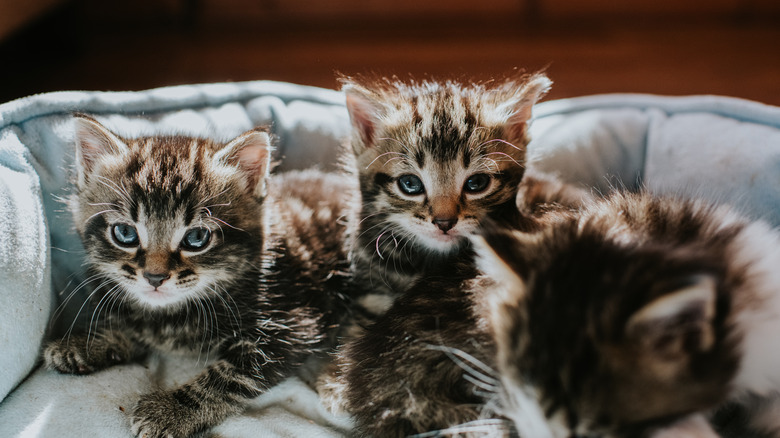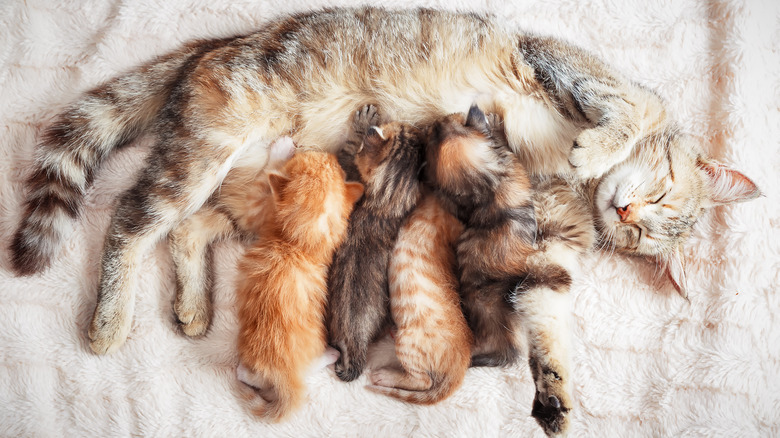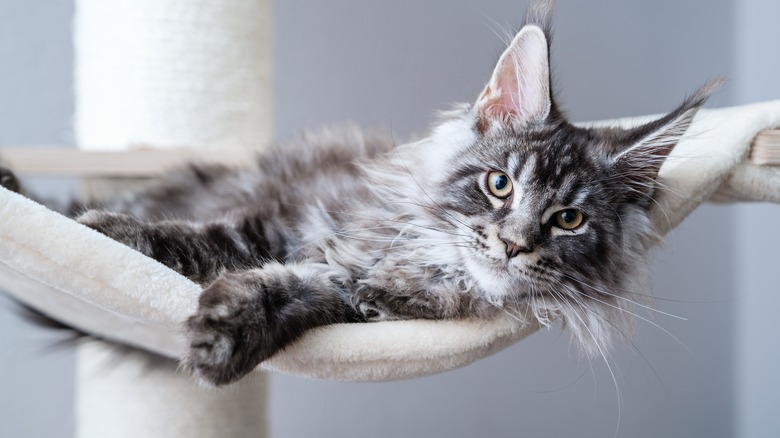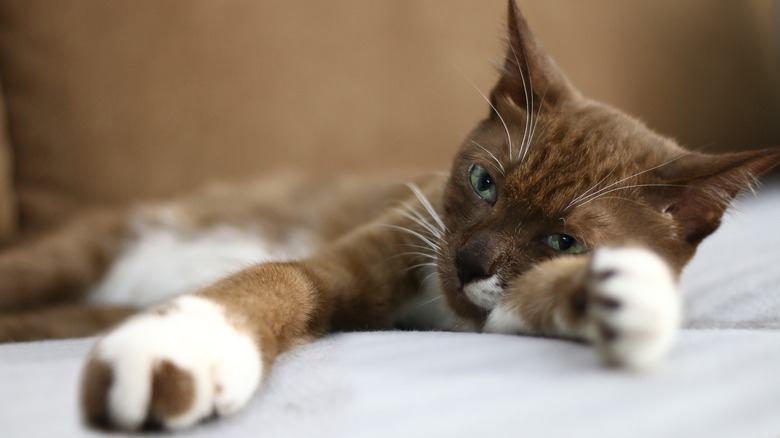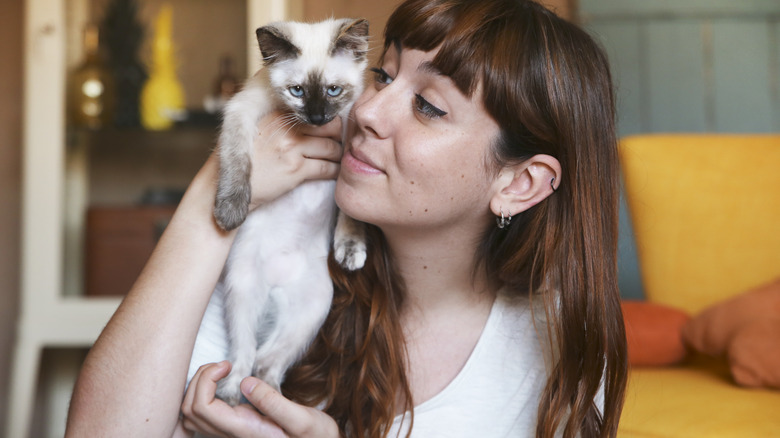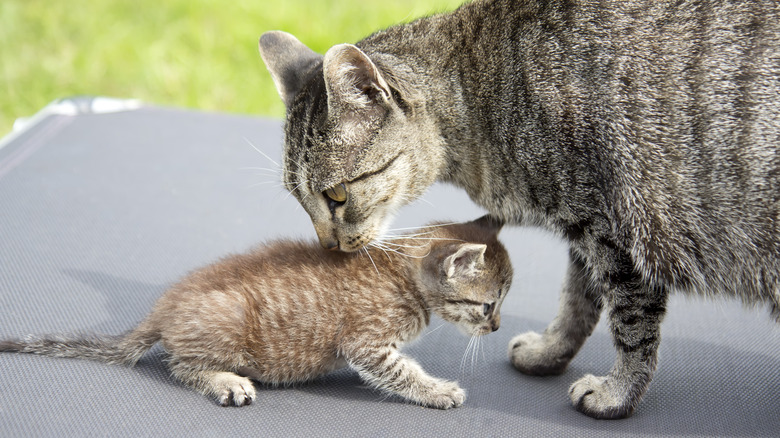How Many Kittens Should You Expect Your Pregnant Cat To Have? It Depends, But There's An Average
If your cat is pregnant, you are probably wondering how many kittens you should be prepared for her to have. Kitten litters are always going to vary in size, as the number of kittens a cat has depends on a number of factors. However, the average number of kittens a cat typically has is four. Cats usually give birth to around three to six kittens per litter, according to petMD, but it's possible for them to have fewer or more.
When it comes to the number of kittens a mom has, trying to predict it isn't an exact science. However, factors such as age, breed, and health can play a role. Whether this is her first litter or if she's had babies in the past can also influence the amount of kittens a cat has. Read on to learn about some of the components that can impact the number of kittens in a litter.
First litter
One factor that can impact the amount of kittens a cat has is whether or not she has had babies before. Typically, a new mama cat's first litter is going to be on the smaller size in comparison to a mom who already had kittens in the past. If it is your cat's first litter, she may only have around one to three kittens, per Cats.com.
If your cat hasn't been pregnant before, you might not know what to expect or how to tell if she is pregnant. Some signs to look out for include vomiting, weight gain, swollen pink nipples, and possible behavioral changes such as being overly affectionate. If you suspect your cat could be pregnant, take her to a vet where they can conduct an ultrasound to conclude if your cat is pregnant. You should be aware, however, that an ultrasound will not be able to tell you how many kittens your mama cat is expecting, just if she is pregnant or not.
Age
Another major component that determines how many kittens a cat has is her age. Even though a younger cat may have a small litter if it's her first, younger moms also tend to have bigger litters after their initial one. When cats start to get older, their litter size tends to decrease.
Cats are able to get pregnant when they start their heat cycle, so it's important to know that this can occur when they are very young kittens. While heat cycles usually start around somewhere between the five to nine month mark, some kittens can start them as young as three months old, per petMD. Unlike humans, cats do not experience menopause, meaning it's possible for them to still get pregnant even in their senior years. However, pregnancy can negatively impact the health of an older cat. To prevent pregnancy, get your feline spayed as soon as possible to stop your cat from being in heat.
Health and stress
The overall health of your cat can also influence how many kittens she may have. If your cat is sick or dealing with an underlying condition, there's a chance she could give birth to a smaller litter. Cats that are malnourished will also likely have a litter that leans on the smaller side, and they are more inclined to experience pregnancy complications.
Stress is another factor that can affect the amount of kittens your kitty has. If your cat is stressed out, there's a chance she will also give birth to a litter that is smaller than normal. There are multiple signs that could indicate your cat is stressed, with a few of them being overgrooming, aggression, going to the bathroom outside the litter box, and hiding. If your pregnant cat appears to show any signs of stress, take her to the vet to rule out any problems she could be facing and to figure out what is potentially causing her stress.
Breed and genetics
The breed of your cat can also help determine the amount of kittens she is going to have. Tammy Sadek, a veterinarian, told Chewy, "Siamese-type cat breeds often have larger litters, Persian-type cat breeds often have smaller litters and Manx cats lose one-fourth of the kittens in every litter if bred tailless to tailless." Other breeds that are prone to having larger litters include the Burmese, Abyssinian, Ragdoll, Maine Coon, and Oriental Shorthair.
Along with breed, genetics can also be a factor when it comes to how many kittens a mama cat will have. Knowing how many kittens your cat's mother had when she was pregnant can be helpful in determining the amount yours will have, but might not always be completely accurate. There's a high chance you most likely don't know the extensive genetic history of your feline, so it's best to not get fully set on a certain amount of kittens before your cat gives birth.
Number of suitors
When a cat is pregnant, there's a chance the kittens could be from multiple different fathers. It's possible for female cats to get pregnant from more than one male cat and give birth to all the kittens in a single litter, a process called superfecundation. The number of kittens belonging to a certain father can vary, but it's possible for each kitten in a litter to have a different dad.
Superfecundation can also impact a cat's final litter size. Since a mama cat can be impregnated by multiple different tomcats and give birth to their kittens all in one litter, she'll likely have more babies with those multiple fathers than she would if her kittens shared a single father. The father's genes can also influence the number of kittens in a litter, just like a mother cat's fertility does.
